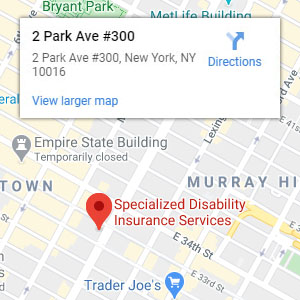Quick answer: As a physician, the cost of your coverage would be calculated with your monthly income in mind at the time of signing up. When buying a disability insurance plan, you should put into account your various financial obligations. Ultimately, you need enough coverage to replace your regular income in the event you are unable to perform your medical duties due to disability or illness.
A young physician’s most valuable asset is their ability to work. As a physician, you know for as long as you are able to work, you can earn enough income to care for yourself and your family.
You can even afford to put away for retirement and protect your potential future wealth. But it all starts with a smart financial approach designed to meet your specific needs.
Disability insurance is a crucial part of a financial portfolio that protects you from falling off the financial track in the event you become sick or injured and unable to practice as medical personnel.
When the paycheck is not coming in as it used to, your insurance company will step in. You will be entitled to a monthly benefit for the duration of your disability. Keep in mind, your policy benefits will determine the amount, duration, and any restrictions.
Let us suppose your HR contact gave you these options to choose from:
Paycheck option A: Would provide $300,000 a year while you are healthy and working but if you became too sick or injured to work, they would not pay anything.
Paycheck option B: Would provide $295,000 a year while you are healthy and working and would provide you with $180,000 (tax-free) a year if you became too sick or injured to work.
Option B ensures that you still get paid even when you are unable to work. Therefore, we have found that over 95% of Physicians prefer to protect their paycheck with individual disability insurance (IDI) policy.
How Much Coverage Is Enough?
The cost of a disability insurance policy and the benefits that come with it generally depends on your income. Based on your profession as a physician, you should consider buying a comprehensive plan large enough to cover student loans, personal loans, living expenses, and even your future wealth.
Therefore, based on your actual wages, you should look to obtain disability benefits of up to 60% to 70% of your gross income. For that amount of coverage, your premium payment would sit between 1% or 3% of your annual income.
The actual premium will be calculated based on how much coverage you intend to buy.
Other essential factors that would affect the cost of your coverage includes the benefit period, the elimination period, your age at the time of buying, your health, medical specialty, and sex.
The benefit period is the duration of time you can receive payments from your insurance company. The elimination period is the length of time it takes before you start receiving checks.
When Is The Best Time To Get Coverage?
There is even a smarter way to go about getting disability insurance coverage at a lower premium rate. The earlier you buy, the lower your premium rates will be, and you can lock in your rates for life.
So, at what age should you contemplate obtaining disability insurance coverage?
Getting coverage at the early stage of your career (between ages 25 to 35) is way cheaper than buying later. This is logical because you are also healthier. The older you get, the less likely you stay healthy, and changes in health can impact rates and quality of coverage.
What Disability Insurance Means For Physicians?
Working as a physician without a disability insurance policy in place is like living life on the edge.
Come to think of it; you have worked all your life to get to this stage. From undergraduate education to completing your residency. Not to mention years of study, student loans, financial sacrifice, and years of grinding away before you can practice your dream job and be properly compensated. Throughout this period, you have your life to live, family to care for, and mortgage or rent to pay. All these can be taken care of provided you are working and can maintain a steady income.
You owe it to yourself to protect all that you are working so hard for. Therefore, disability insurance is the perfect cushion to protect your income and keep you afloat in times of need.
When you sign up for an own-occupation disability plan, your insurance company agrees to pay you a monthly benefit if the event an illness or injury prevents you from practicing your medical specialty, even if you work in another capacity. Disability insurance with an own-occupation definition for disability provides the highest likelihood of receiving benefits, providing you with peace of mind.
What Type of Disability Insurance Policies Are Best for Physicians?
Being a medical specialist, you need to be acutely aware of your policy options and the one that offers you the best coverage. Compare the following benefits:
A. Group Long Term Disability (LTD) Insurance. Generally, group LTD insurance plans are designed to be low cost solutions for employers to offer to their employees.
That means if you are employed by a hospital or large practice, you will likely be eligible or enrolled in group LTD benefits. Your employer will decide who pays the premiums and if coverage is mandatory for all employees or optional.
Typically, this type of policy covers a smaller portion of income than most employees would expect. As a physician your likely to have a higher than average income, so the group LTD insurance alone would not provide you with the adequate coverage you need. The benefits you can receive from these policies are often taxable as income, the policy is not likely to be portable if you leave your employer, and the policies are not always as detailed as desired.
B. Individual Disability Insurance (IDI). When it comes to the type of policy that can adequately protect your income, individual disability insurance is the way to go. Unlike group LTD, with IDI you can elect the amount of coverage and customize it to your needs.
Your coverage remains in place even if you decide to switch jobs in the future. Also, it can also be tailored to meet your specific needs, and you do not have to worry about coverage ever being unexpectedly canceled or modified. With IDI, you are in control of your coverage.
Full comparison: Group LTD vs IDI
Once I Have Assets or If My Spouse Can Work, Do I Still Need Disability Insurance?
Would you want to deplete your savings to cover expenses if you became disabled? For many high-income earners, disability is not just paycheck protection, but also asset protection.
If you have a spouse that is working, you can consider that income as an additional asset.
Consider the following questions: Could your assets/spouse’s income sustain your family’s financial needs? Is it enough for you to fall back on to maintain lifestyle and financial goals? Would you still have enough capital to adequately support your retirement? What are the risks of your spouse also losing their job either due to illness or other factors? What is your investment risk?
Your honest answers to these questions will help you contemplate the correct coverage amounts.
Will Disability Insurance Provide For Retirement?
Disability insurance plans are only designed to replace some of your wages and will pay for a specified period. As such, it becomes virtually impossible to have enough benefits to protect your retirement savings and full financial potential.
Imagine what happens if your collecting benefits from your policy and then your policy ends (commonly at age 65 or 70). Would you have accumulated enough assets for your retirement? Disability can often result in a forced early retirement that can cripple someone’s ability to amass retirement assets. Physicians are at a higher risk than most other occupations, since they get a late start on their carrier and have a shorter duration to put money away, resulting in less time for assets to benefit from compounding. Many physicians also do not have the capacity to work at the same level as they age.
Thankfully, modern disability insurance policies include options to help protect your retirement contributions. Thus, if you are still in the wealth accumulation phase of your life, you should seriously consider buying a policy with the longest possible benefit period and include options to help with retirement.

